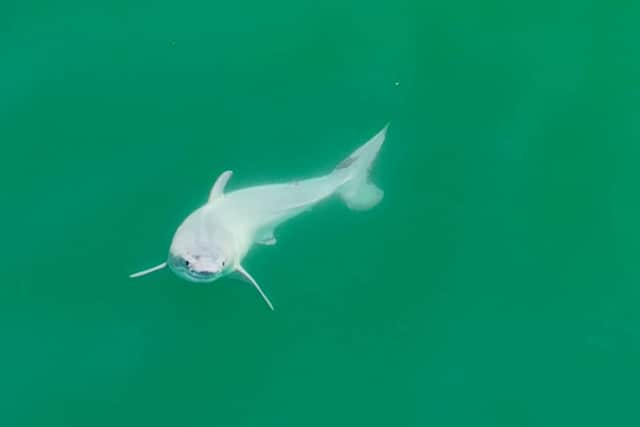Baby shark: Newborn great white caught on camera in first ever sighting
and live on Freeview channel 276
A newborn great white shark, thought to be just hours old, has been seen in the wild for the first time ever - and it was caught on camera.
Wildlife filmmaker Carols Gauna and UC Riverside PhD student Phillip Sternes were scanning the waters for sharks back in July 2023 in Santa Barbara, California, when something unusual appeared on their drone camera’s viewfinder. In their new paper, published this week in science journal Environmental Biology of Fishes, they said the shark, while still about five feet long, was pure white - whereas great white sharks are usually grey on top and white underneath. They believed it had been born just a few hours before.
Advertisement
Hide AdAdvertisement
Hide AdWhile scientists have seen older baby sharks - known as 'pups' - in the past, or even found prenatal babies inside deceased mothers, one has never been seen so soon after its birth. Experts hope the rare sighting could offer new insights into where great whites give birth, which has long been a mystery in shark science.
“We enlarged the images, put them in slow motion, and realised the white layer was being shed from the body as it was swimming,” Mr Sternes told SWNS. “I believe it was a newborn white shark shedding its embryonic layer.”


Mr Gauna, who has spent thousands of hours filming sharks around the world, added: “Where white sharks give birth is one of the holy grails of shark science. No one has ever been able to pinpoint where they are born, nor has anyone seen a newborn baby shark alive."
The pair said it was also possible the white film the shark pup was shedding may have been a skin condition - but that too was an incredible find. “If that is what we saw, then that too is monumental, because no such condition has ever been reported for these sharks,” Mr Gauna said.
Advertisement
Hide AdAdvertisement
Hide AdBut the pair do not believe this to be the case and are convinced that their sighting was of a newborn great white. “Our first evidence is that great white females give birth to live pups,” said Mr Sternes. “While in utero, the embryonic sharks might feed on unfertilised eggs for protein. The mothers offer additional nourishment to the growing shark pups with a ‘milk’ secreted in the uterus. I believe what we saw was the baby shedding the intrauterine milk.”
The second reason was the shark’s size and shape. It was thin, short, and rounded, which indicated it may be a newborn. Finally, large, likely pregnant sharks have been spotted in this area for years – leading to the location long being considered a potential birthing location for great whites.
“I filmed three very large sharks that appeared pregnant at this specific location in the days prior,” Mr Gauna. “On this day, one of them dove down, and not long afterwards, this fully white shark appears. It’s not a stretch to deduce where the baby came from... This may well be the first evidence we have of a pup in the wild, making this a definitive birthing location.”
Many experts previously believed great whites were born further out at sea, but the pup was spotted just 1,000 feet from the beach – suggesting great whites may give birth in shallow waters. If the Santa Barbara spot is confirmed as a great white breeding ground, the team say it needs to be protected to safeguard the future of the species.
Advertisement
Hide AdAdvertisement
Hide AdThe International Union for Conservation of Nature (IUCN) considers great white sharks vulnerable worldwide - although their European population is classed as critically endangered. Some of the main pressures the species face include overfishing decimating their food sources, as well as rising ocean temperatures and plastic pollution.
Great white sharks also migrate great distances - and are not protected everywhere. The species has struggled with a negative reputation for years largely due to the 'Jaws' franchise - something the original author spent many years trying to rectify.
Comment Guidelines
National World encourages reader discussion on our stories. User feedback, insights and back-and-forth exchanges add a rich layer of context to reporting. Please review our Community Guidelines before commenting.
